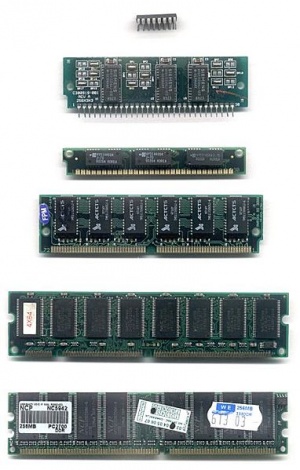Difference between revisions of "RAM"
Onnowpurbo (talk | contribs) |
Onnowpurbo (talk | contribs) |
||
| Line 90: | Line 90: | ||
==Pranala Menarik== | ==Pranala Menarik== | ||
| − | * [[RAM: Lebih | + | * [[RAM: Lebih Detail]] |
== Pranala luar == | == Pranala luar == | ||
Latest revision as of 13:51, 12 January 2010
Memori Akses Acak (bahasa Inggris: Random access memory, RAM) adalah sebuah tipe penyimpanan komputer yang isinya dapat diakses dalam waktu yang tetap tidak memperdulikan letak data tersebut dalam memori. Ini berlawanan dengan alat memori urut, seperti tape magnetik, disk dan drum, di mana gerakan mekanikal dari media penyimpanan memaksa komputer untuk mengakses data secara berurutan.
Pertama kali dikenal pada tahun 60'an. Hanya saja saat itu memori semikonduktor belumlah populer karena harganya yang sangat mahal. Saat itu lebih lazim untuk menggunakan memori utama magnetic.
Perusahaan semikonduktor seperti Intel memulai debutnya dengan memproduksi RAM, lebih tepatnya jenis DRAM.
Biasanya RAM dapat ditulis dan dibaca, berlawanan dengan memori-baca-saja (Read-Only-Memory, ROM), RAM biasanya digunakan untuk penyimpanan primer (memori utama) dalam komputer untuk digunakan dan mengubah informasi secara aktif, meskipun beberapa alat menggunakan beberapa jenis RAM untuk menyediakan penyimpanan sekunder jangka-panjang.
Tetapi ada juga yang berpendapat bahwa ROM merupakan jenis lain dari RAM, karena sifatnya yang sebenarnya juga Random Access seperti halnya SRAM ataupun DRAM. Hanya saja memang proses penulisan pada ROM membutuhkan proses khusus yang tidak semudah dan fleksibel seperti halnya pada SRAM atau DRAM. Selain itu beberapa bagian dari space addres RAM ( memori utama ) dari sebuah sistem yang dipetakan kedalam satu atau dua chip ROM.
Tipe umum RAM
- SRAM atau Static RAM
- NV-RAM atau Non-Volatile RAM
- DRAM atau Dynamic RAM
Tipe tidak umum RAM
- Dual-ported RAM
- Video RAM, memori port-ganda dengan satu port akses acak dan satu port akses urut. Dia menjadi populer karena semakin banyak orang membutuhkan memori video. Lihat penjelasan dalam Dynamic RAM.
- WRAM
- MRAM
- FeRAM
RAM packaging
Semiconductor RAM is produced as integrated circuits (ICs). RAM ICs are often assembled into plug-in modules. Some standard module types are:
- Single in-line Pin Package (SIP)
- Dual in-line Package (DIP)
- Single in-line memory module (SIMM)
- Dual in-line memory module (DIMM)
- Rambus modules are actually DIMMs, but are often referred to (by Rambus themselves and others) as RIMMs due to their proprietary slot.
- Small outline DIMM (SO-DIMM). Smaller version of the DIMM, used in laptops. Comes in versions with 72 (32 bit), 144 (64 bit), 200 (72 bit) pins
- Small outline RIMM (SO-RIMM)
Buffering of RAM modules
Larger RAM modules have significantly higher capacity loads for their signal lines. Buffering reduces these loads, but increases latency.
- Unregistered RAM
- Registered RAM: Address and control lines are buffered, data lines are unbuffered
- Fully buffered RAM: All the lines are buffered
- Address buffered RAM: often used in large memory arrays
Memory wall
In today's computers memory access is becoming very slow when compared to CPU cycles since most computers use cheap, but comparatively slow, DRAM for the main memory. Hence, the memory access, like hard disk access, might become the term that bounds computation speed. This is another important boundary for fast computations.
Shadow RAM
Shadow RAM is the part of RAM with its contents copied from ROMs from where it will run much faster [1]. ROMs are slower to use than RAMs. The original ROM is disabled and the new location on the RAM is write protected. This process is also called shadowing.
Produsen peringkat atas RAM
Pranala Menarik
Pranala luar
- Definition
- What is RAM?
- What kind of RAM do I have? Use the provided images and descriptions to locate the correct computer memory required.
- "How RAM Works" article by Jeff Tyson and Dave Coustan
- Memory eXpansion Technology
- Corsair Memory Basics Presentation (flash required)
